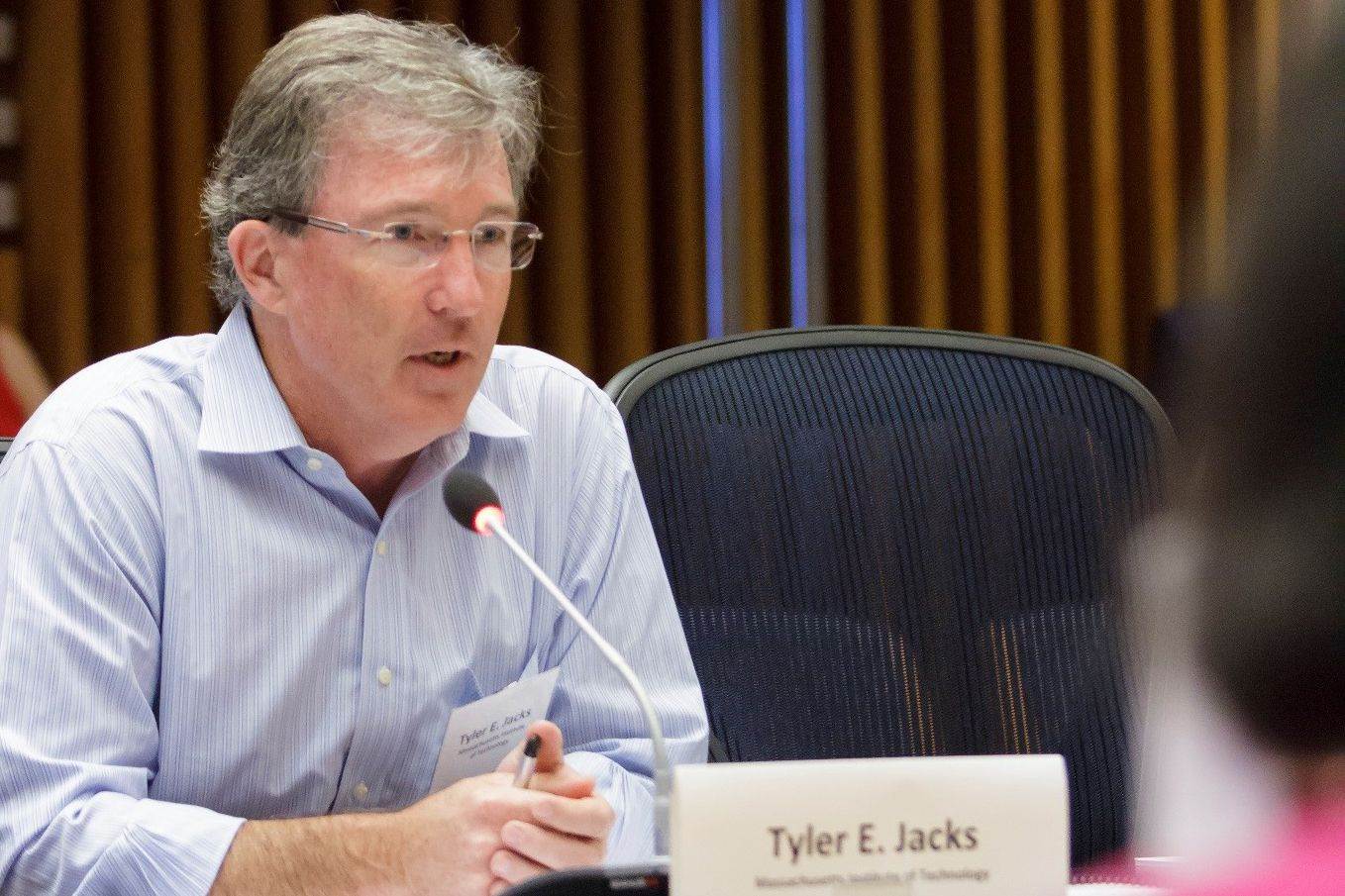
“Now is the time to redouble our efforts (on cancer), not retreat,” stated Tyler Jacks, director of the Koch Institute for Integrative Cancer Research and a David H. Koch Professor of Biology at MIT, in his testimony to the House Committee on Oversight and Government Reform at a March 29 hearing titled “Federally Funded Cancer Research: Coordination and Innovation.”
The hearing was called in response to the recent release of President Trump’s preliminary budget for the fiscal year 2018, which recommends a nearly 18 percent cut to the budget for the National Institutes of Health (NIH) — the parent agency of the National Cancer Institute (NCI). If President Trump’s proposed cut were to pass, it would have a profound impact on both the NCI and NIH — deviating from a trend of bipartisan support for the agencies. This reversal comes on the heels of the 21st Century Cures Act, a sweeping legislation passed in December 2016 that reserves $1.8 billion to support cancer research over a seven-year period, with $300 million allocated for fiscal year 2017.
To better understand the impact federal funding has on cancer research, and how, in turn, federally funded cancer research benefits the country and its citizens, the committee selected a panel that represented both aspects.
Jacks, who has been a cancer researcher for 36 years and previously served as both chair of the National Cancer Advisory Board and president of the American Association for Cancer Research (AACR), was selected as one of the leading cancer research experts for the panel that provided an overview of the impact federal funding has on cancer research initiatives. Jacks was joined by Elizabeth Jaffee, deputy director of the Sidney Kimmel Comprehensive Cancer Center at Johns Hopkins University and AACR president-elect. Jacks and Jaffee — together with Dinah Singer of the NCI — co-chaired the Cancer Moonshot Blue Ribbon Panel. The Blue Ribbon Panel was created in 2016 by U.S. President Barack Obama and Vice President Joe Biden to establish the research agenda for the Cancer Moonshot and to prioritize key areas of cancer research.
Other panelists included Mary Beckerle, chief executive officer and director of the Huntsman Cancer Institute at the University of Utah, and Tammi Carr, founder of the ChadTough Foundation.
Committee Chair Jason Chaffetz (R-UT) set the stage for the hearing by sharing that he had lost both parents to cancer and stating his belief that despite being conservative, he found the current proposal by the Trump Administration to be inadequate — calling it an “embarrassment.”
Ranking member Elijah Cummings (D-MD) discussed the importance of funding medical research, not only as a means of saving lives, but also as a tool of economic stimulation.
“What we do today will not only affect the people on Earth at this moment, but will likely affect generations yet unborn,” Cummings said.
Taking a stand
During his testimony, Jacks detailed the importance of federal funding and argued that reducing NIH support will negatively impact an entire era of biomedical research and innovation. Jacks stressed that President Trump’s proposed NIH budget cuts will not only have devastating effects on the progress against cancer, but also on the ability to train the next generation of biomedical researchers. He told the committee that the sustained and robust support for the NIH and NCI budgets are required to fund the discovery research breakthroughs that enable projects such as the Cancer Moonshot — as well as provide the resources necessary to train future researchers.
“If the budget proposal that was put forward by President Trump were to be enacted, estimates are that zero new grants would be funded next year by the NCI,” Jacks said. “We could not pursue the exciting forms of cancer research that we are currently undertaking if that proposal were to be enacted.”
Jacks, Jaffee, and Beckerle all offered examples of federal support that facilitated discoveries of novel cancer medicines, cancer detection methods, and cancer prevention. Significant developments in immuno-oncology, precision medicine, nanomedicine, and genetic sequencing have had a substantial impact on cancer treatments.
“Research is our best defense against cancer,” Beckerle stated. “Everything we know today about caring for people with cancer is built on decades of research, including basic discovery science, which provides the foundation on which the cancer prevention and treatment strategies of today — and tomorrow — depend.”
As the panel emphasized the impact of cancer research on future generations, the importance of federally funded cancer research for pediatric cancers was one of the most prominent, and emotional, topics discussed during the hearing. Tammi Carr, who started the ChadTough Foundation after losing her son, Chad, at age 5 to Diffuse Intrinsic Pontine Glioma (DIPG) — a highly aggressive and difficult-to-treat cancer which causes brain tumors to form at the base of the brain — gave an impassioned testimony to reiterate the need for federal funding for cancer research to strengthen the fight against pediatric cancers like DIPG.
Earlier in the hearing, the panel affirmed that more than 15 million Americans will be diagnosed with cancer over the next decade, including 150,000 children. In response, Carr argued that the current funding allotment from the NCI to pediatric cancer research was already limited — with approximately only 4 percent of annual NCI funding going directly to support childhood cancers — and that she could not fathom losing the already narrow distribution.
Fuel for growth
Another key point made was the economic benefit that biomedical research — especially cancer research — has on the nation’s economy. In his testimony, Jacks reported that for every 1 percent reduction in cancer death rates, there is an approximately $500 billion value for current and future generations of Americans. He went on to explain that curing or preventing cancer — the second leading cause of death in the United States — would result in an estimated benefit worth approximately $50 trillion.
Jacks used Cambridge, Massachusetts’ Kendall Square as an example of the benefit that federal investment in biomedical research has on the nation’s economy and innovation. Jacks referred to Kendall Square as the “leading center of biomedical research and development in the world” due to numerous companies establishing their headquarters nearby to take advantage of the proximity of leading research universities such as MIT and Harvard University. Jacks cited NIH support as a “major source of fuel” for the biomedical research within the universities’ laboratories that allows the area to serve as an engine for national biomedical advancement.
Work in progress
After the panel’s testimonies, members of the committee asked questions to better understand the government’s role in cancer research. One important Q&A topic was how cancer research facilities across the country share data amongst other researchers and clinicians — as well as cancer patients and their caretakers. Jacks accredited that the Koch Institute’s proximity with leading cancer centers and hospitals like Boston’s Dana-Farber Cancer Institute has benefited the organization significantly, allowing for easier translational opportunities and collaborations like the Koch Institute’s Bridge Project initiative with Dana-Farber/Harvard Cancer Center.
However, he acknowledged that not all institutions can partake in such associations due to limiting factors such as location or socioeconomics, and that a national infrastructure for storing cancer-related information and improving data access and analysis was critical. Jacks noted that one of the recommendations from the Blue Ribbon Panel was to create a National Cancer Data Infrastructure for Sharing and Analysis. He also shared that there are currently other federal programs in place that help facilitate the dissemination of the latest advances in cancer research and medicine to patients in rural and underserved populations, such as the NCI’s Cancer Centers Program and Community Oncology Research Programs.
Another prominent Q&A topic concerned the prioritizing of different areas of cancer research, and whether the funding from the recently passed 21st Century Cures Act would be enough to handle the difference if the slashes to the NIH budget were to pass. All panelists asserted that while the 21st Century Cures Act was an important step in the right direction, it would not be able to cover all that is needed to advance cancer research and preserve the United States’ status as the global leader in biomedical research.
“We lead the world in technology development and research,” Jaffee stated. “We will only stay in the lead if we have increased government investment in the NCI and NIH.”
The panel also underscored that all areas of cancer research — from basic research to clinical testing — are necessary to maintain the success that interdisciplinary, collaborative approaches have in the advancement of cancer research discoveries.
In his testimony, Jacks highlighted the Koch Institute’s “Convergence” approach — the coming together of cancer scientists and cancer-oriented engineers at MIT — to improve progress against cancer. He noted that the approach was “inspired by grants from the NCI that funded interdisciplinary teams of investigators in areas such as computation and mathematical modeling of complex processes in cancer, and nanotechnology applications to cancer treatment and early detection.”
At the conclusion of the hearing, Committee Chair Chaffetz acknowledged that the role cancer research plays within the nation is critical to improving the health and vitality of the country, and that the panel should expect bipartisan support…







